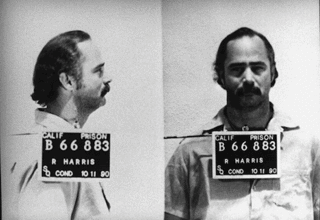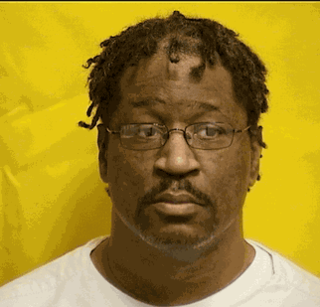Life imprisonment is any sentence of imprisonment for a crime under which convicted criminals are to remain in prison for the rest of their natural lives. Crimes that warrant life imprisonment are usually violent and/or dangerous. Examples of crimes that result in life sentences are murder, torture, terrorism, child abuse resulting in death, rape, espionage, treason, drug trafficking, drug possession, human trafficking, severe fraud and financial crimes, aggravated criminal damage, arson, hate crime, kidnapping, burglary, and robbery, piracy, aircraft hijacking, and genocide.

Measure 11, also known as "One Strike You're Out", was a citizens' initiative passed in 1994 in the U.S. State of Oregon. This statutory enactment established mandatory minimum sentencing for several crimes. The measure was approved in the November 8, 1994 general election with 788,695 votes in favor, and 412,816 votes against.
Lee Boyd Malvo, also known as John Lee Malvo, is an American convicted murderer who, along with John Allen Muhammad, committed a series of murders dubbed the D.C. sniper attacks over a three-week period in October 2002. Malvo was aged 17 during the span of the shootings. He was serving multiple life sentences at Red Onion State Prison in Virginia, a supermax prison. Muhammad was executed in 2009.

Robert Alton Harris was an American car thief, burglar, kidnapper and murderer who was executed at San Quentin State Prison in 1992 for the 1978 murders of two teenage boys in San Diego. His execution was the first in the state of California since 1967.

The rapes and murders of Julie and Robin Kerry occurred on April 5, 1991, on the Chain of Rocks Bridge over the Mississippi River in St. Louis, Missouri. The two sisters were raped and then murdered by a group of four males, who also attempted to murder the sisters' cousin.
Wilson v. State, 652 S.E. 2d 501, 282 Ga. 520 (2007) was a Georgia court case brought about to appeal the aggravated child molestation conviction of Genarlow Wilson.
The Richland High School shooting was a school shooting that occurred on Wednesday, November 15, 1995, in Lynnville, Tennessee, a small community located in Giles County. Seventeen-year-old James Ellison "Jamie" Rouse, a senior student at the school, killed one teacher and one student, and seriously wounded another teacher.
In the United States, life imprisonment is amongst the most severe punishments provided by law, depending on the state, and second only to the death penalty. According to a 2013 study, 1 of every 2,000 inhabitants of the U.S. were imprisoned for life as of 2012.
Graham v. Florida, 560 U.S. 48 (2010), was a decision by the Supreme Court of the United States holding that juvenile offenders cannot be sentenced to life imprisonment without parole for non-homicide offenses.

Jason Keel Sweeney was a construction worker from Fishtown, Philadelphia, Pennsylvania, who at the age of 16 was murdered by four teenagers for his paycheck on May 30, 2003. The perpetrators included a girl he was dating and his best friend since childhood. Due to the manner in which Sweeney was murdered, the ages of the teens involved, and the seeming indifference of the perpetrators, the crime received national media coverage.
Miller v. Alabama, 567 U.S. 460 (2012), was a United States Supreme Court case in which the Court held that mandatory sentences of life without the possibility of parole are unconstitutional for juvenile offenders. The ruling applied even to those persons who had committed murder as a juvenile, extending beyond Graham v. Florida (2010), which had ruled juvenile life without parole sentences unconstitutional for crimes excluding murder.

Anthony Kirkland is an American serial killer. Between 2006 and 2009, Kirkland murdered two women and two girls in the Cincinnati area, following a 16-year prison term for the 1987 killing of his girlfriend.
Cornealious Michael "Mike" Anderson III is an American who was convicted of armed robbery in 2000 and sentenced to thirteen years in the Missouri state prison system. Due to a clerical error, his bond was not revoked when a warrant was issued for his arrest, and Anderson was not arrested because the Missouri Department of Corrections thought he was already in prison. The error was only discovered when he was scheduled to be released from prison in 2013 and he was arrested and required to serve his sentence. His arrest stirred national controversy, especially since he was a changed man by that time, and on appeal Anderson was set free in 2014.

Cyntoia Brown Long is an American author and speaker who was convicted of murder and robbery at the age of 16. Brown, who was a victim of child sex trafficking at the time of the incident in 2004, claimed that Johnny Allen had paid her $150 to have sex with him, and that she feared for her life during their encounter, leading her to shoot him. Prosecutors argued that Brown killed Allen while he was sleeping in order to rob him. Brown was found guilty of robbing and murdering Allen and was sentenced to life imprisonment.
Montgomery v. Louisiana, 577 U.S. 190 (2016), was a United States Supreme Court case in which the Court held that its previous ruling in Miller v. Alabama (2012), that a mandatory life sentence without parole should not apply to persons convicted of murder committed as juveniles, should be applied retroactively. This decision potentially affects up to 2,300 cases nationwide.

Conrad Henri Roy III was an American man who died by suicide at the age of 18. His girlfriend, 17-year-old Michelle Carter, had encouraged him in text messages to kill himself.

One-year-old Antonio Santiago was murdered on March 21, 2013, during an attempted robbery in Brunswick, Georgia, United States. As Santiago and his mother, Sherry West, were returning home from the post office, they were confronted by two youths, 15-year-old Dominique Lang and 17-year-old De'Marquise Elkins. Elkins, who had previously shot another victim he tried to rob, pointed a gun at West and demanded money. When she did not comply he fired two .22-caliber bullets, one of which grazed her head, and the other of which went through her leg. He then shot Santiago in the face, killing him. The murder received national as well as international attention due to the victim's young age.

Kelvin Shelby Malone was an American spree killer who murdered at least four people in March 1981. Convicted of three murders but suspected in five; he was sentenced to death in both California and Missouri in 1983 and 1984 respectively. He remained on death row at San Quentin State Prison until he was extradited to Missouri in December 1998 to face execution. He was executed in January 1999 at the Potosi Correctional Center via lethal injection.
On March 31, 2015, Marie Belcastro, aged 94, was murdered in her Niles, Ohio home by Jacob Larosa, her 15-year-old neighbor. Larosa, who had numerous prior cases in juvenile court, had been released from a juvenile detention facility hours before. He broke into Belcastro’s residence, and, using a MAG flashlight, beat her to death. Larosa also attempted to rape Belcastro. In 2018, Larosa pleaded no contest to charges of aggravated burglary, aggravated robbery, attempted rape, and aggravated murder. Later that year, he was sentenced to life in prison without the possibility of parole. In 2021, a new Ohio law, Senate Bill 256, retroactively reduced his sentence, making him eligible for parole after 25 years. The change to Larosa’s sentence has led to controversy and calls for changes to Senate Bill 256. As of 2022, Larosa’s parole hearing is scheduled for 2040.









